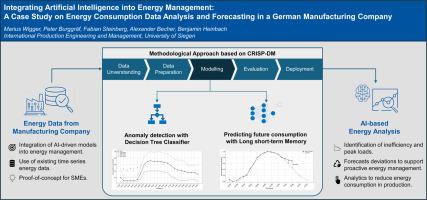Integrating artificial intelligence into energy management: A case study on energy consumption data analysis and forecasting in a German manufacturing company
IF 9.6
Q1 COMPUTER SCIENCE, ARTIFICIAL INTELLIGENCE
引用次数: 0
Abstract
The pressing need to enhance energy efficiency, as outlined by the United Nations within its Sustainable Development Goals, underscores the importance of reducing energy consumption in manufacturing companies. Energy management systems are essential in achieving this goal by systematically identifying inefficiencies and uncovering potential savings through the analysis of energy consumption data. With the growing utilisation of Artificial Intelligence (AI), there is significant potential to leverage advanced data analytics to predict future energy consumption and detect anomalies. However, current research focus on the theoretical development and refinement of AI models, a practical integration of AI into energy management systems within manufacturing companies remains limited, particularly in small and medium-sized enterprises (SMEs). This case study introduces a proof-of-concept implemented in a German manufacturing company to demonstrate how AI models can be integrated into energy management systems using existing data resources. Utilising the Cross-Industry Standard Process for Data Mining (CRISP-DM) framework, an AI-based evaluation algorithm was developed to detect changes in energy consumption patterns and predict future consumption. The findings reveal that AI models such as Long short-term memory enable the prediction of future energy consumption with remarkable accuracy as well as the identification of deviations that traditional systems might overlook. This study emphasises the transformative capacity of AI-driven energy management systems in enhancing operational efficiency and facilitating compliance with ISO 50001 standards. It provides a practical approach for broader adoption of intelligent data analytics in energy management, particularly for SMEs, aiming to pave the way towards a more sustainable industrial sector.

将人工智能融入能源管理:以德国制造企业能源消耗数据分析与预测为例
正如联合国在其可持续发展目标中所概述的那样,迫切需要提高能源效率,这凸显了降低制造企业能耗的重要性。能源管理系统是实现这一目标的关键,它通过分析能源消耗数据系统地识别低效和发现潜在的节约。随着人工智能(AI)的日益普及,利用先进的数据分析来预测未来的能源消耗和检测异常具有巨大的潜力。然而,目前的研究主要集中在人工智能模型的理论发展和完善上,将人工智能与制造企业的能源管理系统的实际集成仍然有限,特别是在中小型企业(SMEs)中。本案例研究介绍了在一家德国制造公司实施的概念验证,以演示如何利用现有数据资源将人工智能模型集成到能源管理系统中。利用跨行业数据挖掘标准流程(CRISP-DM)框架,开发了一种基于人工智能的评估算法,以检测能源消耗模式的变化并预测未来的消耗。研究结果表明,长短期记忆等人工智能模型能够非常准确地预测未来的能源消耗,并识别传统系统可能忽略的偏差。本研究强调了人工智能驱动的能源管理系统在提高运营效率和促进遵守ISO 50001标准方面的变革能力。它为在能源管理中更广泛地采用智能数据分析提供了一种实用的方法,特别是对中小企业而言,旨在为更可持续的工业部门铺平道路。
本文章由计算机程序翻译,如有差异,请以英文原文为准。
求助全文
约1分钟内获得全文
求助全文
来源期刊

Energy and AI
Engineering-Engineering (miscellaneous)
CiteScore
16.50
自引率
0.00%
发文量
64
审稿时长
56 days
 求助内容:
求助内容: 应助结果提醒方式:
应助结果提醒方式:


